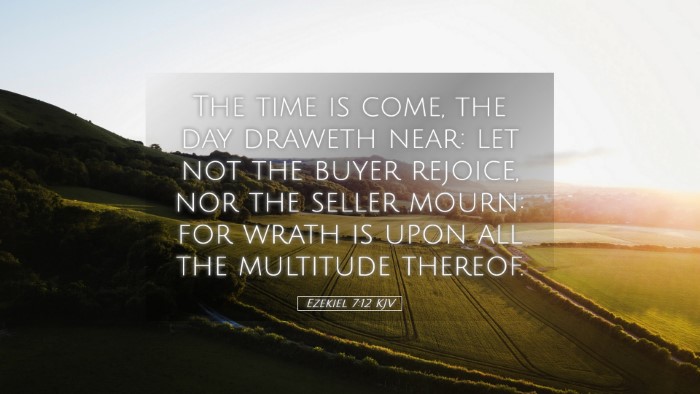Ezekiel 7:12 - Commentary and Insights
Bible Verse: "The time has come, the day draws near. Let not the buyer rejoice, nor the seller mourn, for wrath is upon all their multitudes."
Introduction
Ezekiel 7:12 stands out as a potent warning of impending judgment and a call to recognize the seriousness of the times. In this verse, God, through the prophet Ezekiel, reveals the impending doom that will befall Jerusalem and its inhabitants. This commentary synthesizes insights from public domain commentaries to provide a deeper understanding of this critical passage.
The Context of Ezekiel 7
Moving through Ezekiel 7, one encounters a vivid description of the destruction that is about to come. Matthew Henry notes that this chapter serves as a turning point, marking the finality of God's judgment upon His people due to their persistent sin and rebellion. The surrounding chapters detail the spiritual and moral decay that precipitated God's righteous anger.
Verse Analysis
The Time Has Come:
This phrase indicates that the prophetic warnings have reached their climax. Albert Barnes comments on the urgency of the warning, signaling that the opportunities for repentance have passed, and it is now too late for salvation.
Let Not the Buyer Rejoice, Nor the Seller Mourn:
Adam Clarke emphasizes the futility of commerce and normal life during such ominous times. The economic transactions which usually bring joy or sorrow are rendered meaningless under the shadow of impending judgment. There is a sense of a societal collapse where material gain cannot provide solace or hope.
For Wrath Is Upon All Their Multitudes:
The multifaceted nature of God’s wrath is evident here. Matthew Henry explains that this wrath transcends individual judgment, encompassing the collective responsibility of the people. It reflects the totality of the consequences for their unfaithfulness.
Theological Implications
The implications of Ezekiel 7:12 prompt reflection on God’s justice and mercy. While God's judgment is severe, it is ultimately rooted in His holiness. The contrast between the buyer’s delight and the seller’s grief epitomizes the chaos that ensues from abandoning divine principles.
Albert Barnes illustrates that divine justice does not favor worldly endeavors when they defy God's will. This reality reminds believers to maintain their focus on eternal values rather than temporal gains, aligning their lives with God’s purposes.
Practical Applications
-
Awareness of Times: Just as the people of Israel were to be aware of the approaching judgment, modern believers must remain vigilant and discerning regarding spiritual conditions and moral choices within their communities.
-
Prioritizing Spiritual Wealth: The perils of trusting in material possessions are starkly highlighted. The commentary points to a need for believers to invest in spiritual capital rather than succumbing to the transient nature of earthly wealth.
-
Responding to God’s Warnings: Ezekiel’s message urges a proactive approach in examining one’s life for areas of spiritual complacency or rebellion. A heartfelt response to God's conviction is crucial for fostering genuine growth and transformation.
Conclusion
Ezekiel 7:12 serves as a poignant reminder of the inevitability of divine judgment while reinforcing the importance of aligning oneself with God's intentions. By examining the insights drawn from respected commentators, modern readers can appreciate the depth and urgency of this verse. It encourages believers to find true joy and purpose not in earthly matters but in a lifelong commitment to God's will and righteousness.


